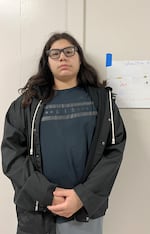OPB has spent the last week looking at the many challenges facing unsheltered young adults and the limited resources the state has put toward helping them. We looked at new and deadly forces that are working against young people today and how service providers are responding. And we highlighted a new homelessness prevention intervention for youth that Oregon is piloting.
In this final story of the series, three young people with lived experience of homelessness share their ideas on how to improve support for Oregon’s homeless youth.
Jessica Tucker, 23, Medford, Ore.

Jessica Tucker experienced homelessness in Southern Oregon. "I want to use my experience to make sure others in similar situations don't have to deal with the same struggles I did," said Tucker.
Jessica Tucker / OPB
Jessica Tucker works as a mental health peer support specialist at Hearts with a Mission, a nonprofit serving families and youth experiencing homelessness in Jackson County. Tucker is a founding member of Oregon’s Youth Advisory Board, a group created by the state’s Department of Human Services in 2023. The board counsels ODHS on all initiatives and services regarding youth homelessness throughout the state.
Tucker grew up with a mother who struggled with addiction and experienced homelessness as a teenager and young adult. She hopes to use her experience to make a difference in the homeless youth community.
“Growing up the way I did and having the experiences I had, I always thought, ‘This isn’t OK, this isn’t normal,’” said Tucker. “As I’ve overcome those challenges throughout my life, I want to use my experience and skills I’ve gained to help others.”
Austin Fore, 16, Eugene, Ore.

Housing instability was a regular part of Austin Fore's life as a child. He wants to see the state focus on getting homeless youth housed.
Austin Fore / OPB
Austin Fore is a sophomore at North Eugene High School in Lane County. Fore is incredibly active in the homeless youth advocacy realm, as a member of both Eugene’s Youth Advisory Council and the state’s Youth Advisory Board.
Fore experienced family homelessness with his disabled father for several years, living in several states since he was a toddler. Fore and his father have been stably housed for more than two years in Eugene, after receiving shelter and housing support from St. Vincent de Paul Society of Lane County.
“I want to make a difference for one homeless youth, that’s my personal goal,” said Fore of his work with Oregon’s Youth Advisory Board. “It’s the very least I could do since the [homeless services] community helped my family when I was homeless.”
Looking forward, Fore said he wants to study business and play football in college.
Brandt Maina, 26, Portland, Ore.

While unsheltered Brandt Maina accessed resources at p:ear, a homeless youth community center in downtown Portland. "The importance of community cannot be understated when you are going through trauma," said Maina.
Kim Oanh Nguyen / OPB
Brandt Maina is an artist, writer, performer and director based in Portland. In addition to their own work, Maina develops creative programming for Push Movement, a nonprofit promoting addiction recovery for youth through skateboarding. They’ve also worked with the Oregon Health Equity Alliance to expand the group’s reach with immigrant and refugee communities.
They first experienced periods of housing instability after graduating from college in Indiana in 2020. Maina hopes their work inspires kindness and empathy in others.
“I haven’t given up hope that we can actually encourage people to care, be more compassionate and to show up for each other,” said Maina.
Maina has been in stable housing since late 2021.
The following is an audio transcript edited for clarity. Listen to the full clip at the top of this story.
Jessica Tucker: My name is Jessica Tucker. I am 23 years old and I’m a mental health peer support specialist. One thing that I would love the general public to understand about youth homelessness: It’s so much more common than you would think. So a lot of people will complain and have issues with the homeless community, like people in the parks. But what they fail to see is all of the kids and young adults that are in there as well.
I had a mother who was struggling with addiction and her mental health. From age 12 to 17, I was couch-hopping and I was also staying in a youth shelter, which is where I work now. I struggled a lot trying to stay in school and trying to just focus on myself because I always had to babysit my mom and make sure she didn’t overdose.
There’s got to be something done to have more help for people that are struggling with addiction and more resources for the child that is having to deal with their parents addiction, and the aftermath of all of that.
Austin Fore: My name is Austin Fore. I am 16 years old and I am living in Eugene, Oregon. I’ve spent four years of my life, total time, being homeless. It’s not an easy thing to live on the street, especially when you’re a kid, especially when you have all this stigma around you. There’s not only physical problems, there’s normally psychological ones that are much worse.
Brandt Maina: Having people who just see you as a human being, hold space for you and make sure that you are doing OK, that’s so important.
My name is Brandt Maina. I am 26 years old. The most powerful thing I learned when I was unhoused was the power of who you know, but also your ability to communicate really clearly who you are and what you need. That’s really hard when all you’ve ever known is instability. That’s really hard when nobody’s ever trained you how to do that.
Tucker: An idea to help the transition between being a minor and being an adult is having a rent well class in high schools because it helps with teaching young adults how to get housing, how to build credit and how to know all of the steps it takes to get into housing. It would be a big help because there’s many youth that don’t have parents or people to guide them with those things. It’s a big contributor to youth homelessness.
Fore: The number one thing that I wish people would understand about being homeless is how mentally draining it is, how scary it is to not know your future. You don’t know if you’re gonna be uncomfortable when you sleep. You don’t know if you’re gonna have food. You don’t know if you’re gonna have water. You don’t know if you’re gonna have anything.
Maina: The reality of it is, the system that exists, is not accessible to everyone. I was homeless for three months and out of it in three months because I have a good head on my shoulders and a college education. That’s not equal at all, like those opportunities are not equitable for people to access.
Tucker: I would like the general public to understand that there’s a strong need for there to be a change to start preventing and aiding youth homelessness so it’s not as common.
Fore: And that change needs to happen now. It’s going to take the community as a whole to work together, to bond together, [and work to] fix this problem.
Maina: Hang in there, hang in there. Hang onto your hope, you are going to need it. And if you’ve got some stability, you’re going to need to extend your hand to your neighbor. So hang on, hang on.
